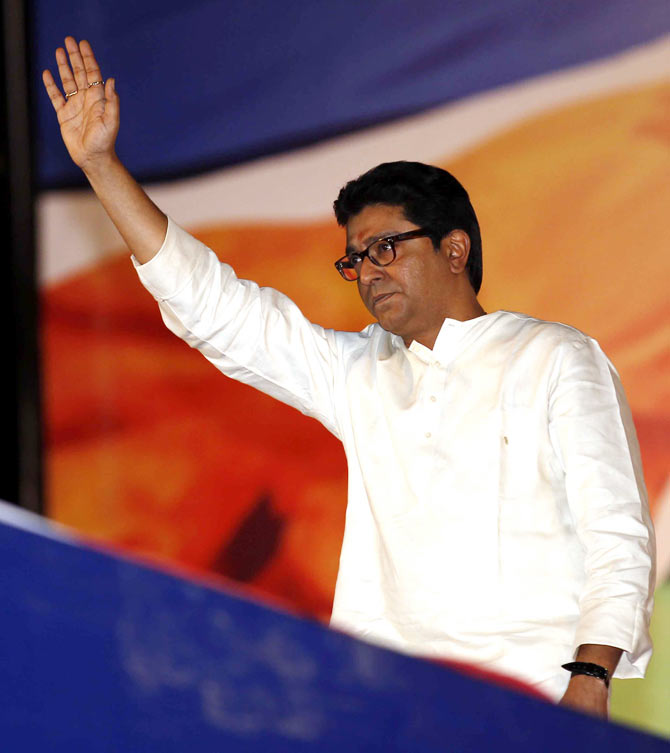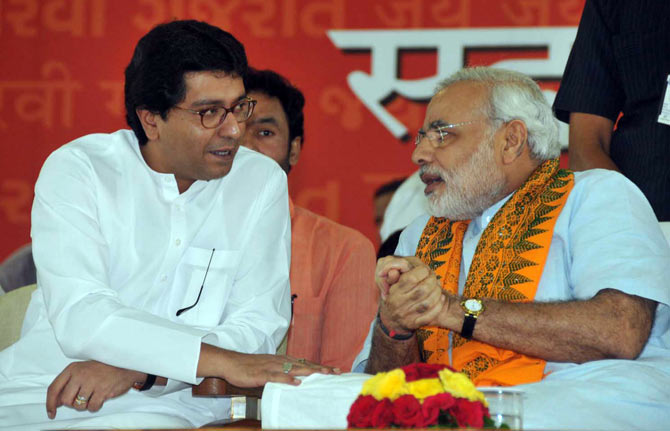 | « Back to article | Print this article |
'This is MNS's big fight to the finish'
The MNS gameplan is to create a rift in the Shiv Sena-BJP alliance in Maharashtra, then replace the Sena in the alliance for the assembly election, reports Rediff.com's Prasanna D Zore.
The shrillness against north Indian migrants during Raj Thackeray's public rallies is starkly missing in the 2014 Lok Sabha election campaign. His many media interviews too -- interestingly in Hindi now after steadfastly refusing to speak in Hindi during similar interviews before the 2009 Lok Sabha polls -- show a remarkably changed Maharashtra Navnirman Sena president.
In contrast to 2009, when Thackeray went hammer and tongs against the migrants, notably from Bihar and Uttar Pradesh in his election campaign, the MNS is running its 2014 Lok Sabha campaign solely on the issue of governance, development and support to the Bharatiya Janata Party's prime ministerial aspirant Narendra Modi.
What has changed in the last five years?
Why does the MNS seem not very serious fighting the Lok Sabha election in Maharashtra?
What is the MNS's larger gameplan?
Nothing seems to have changed much for the MNS in the last five years. Except that the party now boasts of 12 members in the Maharashtra legislative assembly who won the 2009 Vidhan Sabha election, mostly from urban constituencies in Maharashtra.
There were 13, but the MNS lost the by-election to the Khadakvasla assembly constituency held in October 2011 after the death of its MLA Ramesh Wanjale.
The MNS played spoilsport in the 2009 Lok Sabha election by dividing votes of Maharashtrians in Mumbai, by playing a big role in the defeat of all six candidates of the Shiv Sena-BJP alliance (Read: that report here).
The MNS was established as a political party in 2006 after Shiv Sena supremo Bal Thackeray anointed his youngest son Uddhav as executive president, sidelining his nephew Raj, who coveted the post. Disenchanted with his uncle's decision, Raj Thackeray formed the MNS, with the express aim of securing the rights and interests of Maharashtrians -- the Marathi manoos.
"This is a big fight to the finish," says political commentator Prakash Bal Joshi about the MNS gameplan.
Please click NEXT to read further...
'The MNS is preparing for the assembly election'
While Uddhav Thackeray, in his bid to expand the Shiv Sena's footprint in Maharashtra, may have moved on to issues of governance and development, the Sena's executive president has also been raising perennial Sena issues like 'jobs for locals' that appeal to Sena cadres and supporters.
"Both the Shiv Sena and MNS get their sustenance from the Marathi manoos and hence they are fighting a pitched battle to secure and strengthen their traditional vote banks. They are fighting each other for the dominance of these sections," says Prakash Bal Joshi.
This Lok Sabha election has offered the warring cousins the opportunity to lay the groundwork for the assembly election in Maharashtra, expected to be held later this year.
"My impression is that they (the MNS) are not serious and are exploring this Lok Sabha election as grounding for the forthcoming assembly election," explains Dr Suhas Palshikar, the well-known political theorist who teaches political science at the University of Pune.
The MNS has fielded only three candidates against the six it fielded in 2009, allowing MNS critics to claim that the party is not serious about fighting the parliamentary election this time.
MNS Vice-President Vagheesh Saraswat is quick to refute such observations, insisting that the party has fielded candidates this time after scholarly studying the chances of its candidates' victory.
"We are just focussing on the victory of our candidates," Saraswat says. "The places we think our candidate can win, we have fielded them."
Asserting that the MNS will win all the three seats it is contesting in Mumbai, Saraswat says, "I would not like to comment on what the Shiv Sena is writing about the MNS in their mouthpiece (Saamna, the newspaper published by the Shiv Sena). Rajsaheb will give a fitting reply at the right time and place."
Please click NEXT to read further...
'The MNS wants the BJP to turn to it rather than the Shiv Sena'
Apart from splitting the Maharashtrian vote, one charge that will take some time for the MNS to come clean about is its flirting with the BJP, the Shiv Sena's oldest ally.
"The BJP is wary of the split in votes because of the MNS contesting elections against the Shiv Sena and hence (the BJP's leaders in Maharashtra) Gopinath Munde and Nitin Gadkari did try to cut some deal with the MNS to get the two warring brothers (Uddhav and Raj) on the same platform but the Shiv Sena, which also claims to represent the same constituency (the Marathi manoos), would not have any of it," says Prakash Bal Joshi, adding that the Shiv Sena may benefit because of the strong undercurrent in favour of Narendra Modi in Maharashtra.
Observers believe that Raj Thackeray has a plan when he is, on one hand, fielding strong candidates against the Shiv Sena, but not the BJP, publicly expressing his admiration for Modi, his meeting with former BJP president Nitin Gadkari and his tacit support for Gopinath Munde's bid to win his Lok Sabha seat in Beed.
"Their (the MNS's) larger gameplan seems to garner more votes of the Marathi manoos so that they can emerge as a credible partner to the BJP (instead of the Shiv Sena) during the assembly elections," says Dr Palshikar of Pune University.
"(While they) are trying to prove their nuisance power to the BJP-Shiv Sena alliance, the MNS would want the BJP to turn to them rather to the Shiv Sena," he adds.
The Shiv Sena-BJP alliance took shape almost 25 years ago but the BJP has been uncomfortable with this alliance since 2009 because the Shiv Sena's appeal has declined.
"When they entered into an alliance in the late 1980s the BJP was the junior partner in terms of the number of assembly seats that the Shiv Sena contested. Subsequently, the Shiv Sena seems to have lost the plot and after the split between the Thackeray cousins, the Shiv Sena has rather become a junior partner they (thye BJP) have grown tired of," says Dr Palshikar.
"Their (the BJP's) plan," adds Dr Palshikar, "seems to get the Shiv Sena out of the alliance."
Please click NEXT to read further...
'Raj Thackeray thinks the MNS can become the true representative of Marathi interests'
Admitting that the MNS has a lot of groundwork ahead of it before it makes its mark across Maharashtra, Saraswat, the MNS vice-president, lays out the party strategy thus: "We have not yet reached every section of Maharashtra's voters. But at places where we have solid pockets, where we feel we have chances of winning, we have fielded our people."
"Our policy is to first win one fort and then prepare for the next one," he says, perhaps drawing an analogy with the MNS and Shiv Sena's great hero, Chhatrapati Shivaji Maharaj.
"For us Mumbai, Nashik, Pune and Thane are the biggest forts which we plan to capture first," he adds. "Once we win these forts, we will win the entire state."
The MNS had a 4.1 per cent vote share in Maharashtra in the 2009 Lok Sabha election, and a whopping 21 per cent of the vote share in Mumbai's six parliamentary constituencies.
Consequently, the MNS secured a 5.7 per cent vote share during the 2009 assembly elections, and won 13 seats.
Saraswat refutes the belief that the MNS is an urban phenomenon and concentrates only on the urban pockets of the four cities he mentions.
"Why would we field a candidate in Yavatmal-Washim (a Lok Sabha constituency in eastern Vidarbha which is always in the news because of farmers' suicides) if we were not serious about expanding our base in rural Maharashtra?," he asks.
Dr Palshikar says he is unimpressed by the way the MNS has expanded in the last five years.
"I don't think the MNS has done much groundwork to expand in non-urban Maharashtra," he observes.
Concurring with Saraswat's plan to capture Maharashtra, he agrees the MNS will first try to take on the Shiv Sena in urban Maharashtra before trying to consolidate in the rural parts of the state.
"The MNS would rather first replace the Shiv Sena there (in urban Mumbai, Nashik, Pune and Thane) and then perhaps concentrate on rural Maharashtra," he adds.
has the last word when it comes to the impression that the MNS seems to have created in the minds of the Marathi manoos because of his strategy to pit strong candidates against the Shiv Sena but leaving the field open to the BJP, thereby trying to cut another saviour of Marathi interests in the state.
"I think Raj Thackeray is prepared to take the criticism of splitting the votes of Marathi manoos because he thinks he and his party can ultimately become the true representative of Marathi interests," says Dr Palshikar.
Raj Thackeray would want more and more Shiv Sena cadres and leaders to be frustrated with Uddhav Thackeray and join his party, Dr Palshikar feels.
"That's the gameplan. That is a gamble he is taking," says Dr Palshikar. "How far he succeeds is a different matter."



